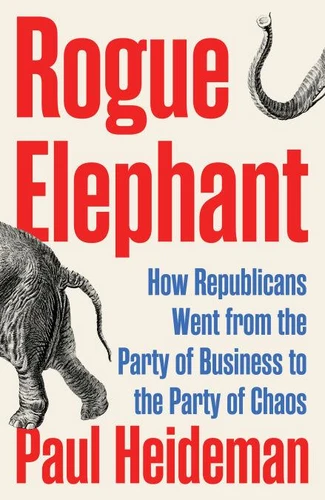Rogue Elephant. How the Republicans Went from the Party of Business to the Party of Chaos
Par :Formats :
Actuellement indisponible
Cet article est actuellement indisponible, il ne peut pas être commandé sur notre site pour le moment. Nous vous invitons à vous inscrire à l'alerte disponibilité, vous recevrez un e-mail dès que cet ouvrage sera à nouveau disponible.
Disponible dans votre compte client Decitre ou Furet du Nord dès validation de votre commande. Le format ePub protégé est :
- Compatible avec une lecture sur My Vivlio (smartphone, tablette, ordinateur)
- Compatible avec une lecture sur liseuses Vivlio
- Pour les liseuses autres que Vivlio, vous devez utiliser le logiciel Adobe Digital Edition. Non compatible avec la lecture sur les liseuses Kindle, Remarkable et Sony
- Non compatible avec un achat hors France métropolitaine
 , qui est-ce ?
, qui est-ce ?Notre partenaire de plateforme de lecture numérique où vous retrouverez l'ensemble de vos ebooks gratuitement
Pour en savoir plus sur nos ebooks, consultez notre aide en ligne ici
- Nombre de pages224
- FormatePub
- ISBN978-1-80429-410-9
- EAN9781804294109
- Date de parution11/05/2026
- Protection num.Adobe DRM
- Taille596 Ko
- Infos supplémentairesepub
- ÉditeurVerso
Résumé
Rogue Elephant traces the radicalization of the Republican Party over the past fifty years, arguing that its subordination to Donald Trump was not an anomaly, but rather the culmination of processes at work for decades. Providing a new perspective on figures from Newt Gingrich and George W. Bush to the Koch brothers and Donald Trump, it shows that the party's lurch to the far right was the product of a volatile mix of a disorganized party structure and a divided and fractious class of American business owners.
These forces have propelled ever more reactionary leaders to the front of the party, setting up cycles where the insurgents of one period become the party establishment of the next, and find themselves confronted with a new batch of insurgents even farther to the right. The result is that a party once seen as the handmaiden of American business has increasingly come into conflict with business groups like the Chamber of Commerce.
Considering the implications of these dynamics for American democracy, Paul Heideman warns that there may be no going back to normal for the Republican Party without a much broader transformation of American society.
These forces have propelled ever more reactionary leaders to the front of the party, setting up cycles where the insurgents of one period become the party establishment of the next, and find themselves confronted with a new batch of insurgents even farther to the right. The result is that a party once seen as the handmaiden of American business has increasingly come into conflict with business groups like the Chamber of Commerce.
Considering the implications of these dynamics for American democracy, Paul Heideman warns that there may be no going back to normal for the Republican Party without a much broader transformation of American society.
Rogue Elephant traces the radicalization of the Republican Party over the past fifty years, arguing that its subordination to Donald Trump was not an anomaly, but rather the culmination of processes at work for decades. Providing a new perspective on figures from Newt Gingrich and George W. Bush to the Koch brothers and Donald Trump, it shows that the party's lurch to the far right was the product of a volatile mix of a disorganized party structure and a divided and fractious class of American business owners.
These forces have propelled ever more reactionary leaders to the front of the party, setting up cycles where the insurgents of one period become the party establishment of the next, and find themselves confronted with a new batch of insurgents even farther to the right. The result is that a party once seen as the handmaiden of American business has increasingly come into conflict with business groups like the Chamber of Commerce.
Considering the implications of these dynamics for American democracy, Paul Heideman warns that there may be no going back to normal for the Republican Party without a much broader transformation of American society.
These forces have propelled ever more reactionary leaders to the front of the party, setting up cycles where the insurgents of one period become the party establishment of the next, and find themselves confronted with a new batch of insurgents even farther to the right. The result is that a party once seen as the handmaiden of American business has increasingly come into conflict with business groups like the Chamber of Commerce.
Considering the implications of these dynamics for American democracy, Paul Heideman warns that there may be no going back to normal for the Republican Party without a much broader transformation of American society.



